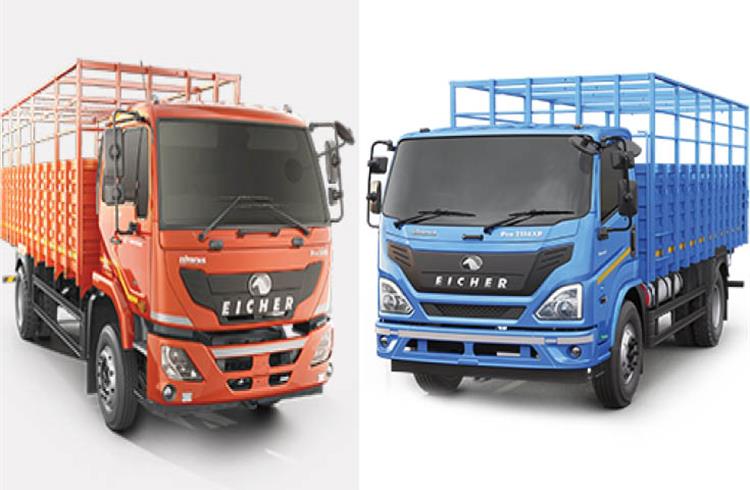CNG a key part in VECV’s sustainable growth plans
VECV portfolio offering CNG has been expanded to cover tonnages ranging from 4.9 to 16 tonne.
VECV is expanding its net in the market with new variants using the alternate fuel and gains 50 percent of its June sales from CNG trucks. It’s also focusing on the heavy truck segment and overseas markets for growth.
Diesel is the mainstay of the Indian trucking industry, but CNG is gradually increasing its presence. The trend of rising fuel prices aside, the growing distribution network for the alternate fuel is making truckers opt for CNG trucks. The significant gap between CNG and diesel prices was always a favourable case for CNG. “And we also have now ensured that in single fill of the gas, you can go up till 550 kilometers. So, you can go from Delhi to Jaipur and come back,” Vinod Aggarwal, MD & CEO tells Autocar Professional. He also finds that some of VECV’s CNG truck customers make trips from Delhi to Mumbai, as the fuel’s distribution network improves.
The government wants to have a network of 10,000 CNG stations by 2025. At the beginning of this financial year, the overall number of CNG retail pumps stood at close to 3150. The government expects CNG to be the primary fuel in meeting India’s incremental energy requirement by 2050.
By then the share of CNG in the Indian trucking industry could also grow significantly. Its share in the light and medium commercial vehicle (L&MCV) market has grown to around 20 percent. It’s a little more for VECV. Around 25 percent of its L&MCV sales comes from CNG trucks. VECV portfolio offering CNG has been expanded to cover tonnages ranging from 4.9 to 16 tonne. VECV has been an early mover in the CNG space, but added this option in the 14 and 16 tonne categories not too long ago. CNG trucks contributed to 37 percent of VECV’s overall sales during Q1 of this financial year. And in June, CNG trucks contributed to half of the OEM’s total sales. “There's a lot of migration that has happened to the alternate fuels,” says Aggarwal.
A good part of the migration can also be triggered by the increased focus on freight costs, in an environment facing multiple challenges, including the Covid impact. The cost of CNG, at a little over Rs 43 a kg is less than half the price of a litre of diesel in Delhi. With fuel efficiency of the trucks being more or less the same, it’s a no-brainer why there’s a migration towards CNG. A back-of-the-envelope calculation shows that if a truck is driven for 7,000 KMs a month, the savings over diesel could be to the tune of Rs 45,000, considering a fuel efficiency of 7 KMs to a lite/KG. For BS VI trucks there’s an approximate 5 percent additional cost of AdBlue that’s required for the exhaust aftertreatment system. So, the difference in freighting cost can be Rs 50,000 in a month, if it’s a BSVI truck. “So if you can migrate to CNG, then why not?” asks Aggarwal.
With the growing trend of adopting CNG and VECV’s push in this segment, it won’t be surprising to see CNG trucks having a majority of the OEM’s sales, especially in the 9 to 17 tonne segment, on an annual basis.
Heavy focus on HCV segment, EV can wait
Though the Eicher brand has been present in the market for long, it hasn’t yet entered the low-end of the CV industry though there are growing opportunities in that space. Aggarwal clarifies that competition is not the reason for avoiding that segment. “The reason is we don't want to de-focus ourselves from our sights on the other opportunities in the CV market, like we are very focused now on the heavy-duty trucks side. Heavy duty trucks market opportunity is very large. We are very small there,” says Aggarwal. Though the market is far from being in the pink of health, Aggarwal expects replacement demand to be the key demand driver at this stage. And that’s where VECV wants to focus on for expanding its presence, before it toying with the idea of entering the lower end of the CV industry spectrum.
On the emerging electrification trend, Aggarwal feels the business case is still not strong enough for electric CVs. Though VECV had introduced an electric bus, with KPIT Technologies as the tech partner, it could be some time before a serious play by the Eicher brand in the EV space. “We don't want to burn money by becoming the pioneers. We are ready with the technology, when the business model is right, we will just pump the vehicles,” says Aggarwal categorically.
Opportunities overseas
Equipped with a ‘modernised’ range of trucks that meet the stringent BSVI norms, VECV could pump up its exports business, before rolling out EVs. “Now we can compete with the Japanese trucks and that is a huge potential in advanced markets,” says Aggarwal. He sees good prospects in South East Asian markets, African markets like South Africa (already launched with the UD brand), Morocco, Algeria.
For now, Aggarwal and his team would hope for the Covid hit domestic industry to regain good health.
RELATED ARTICLES
Bosch hydrogen engine tech-powered truck to be on Indian roads this year
The global supplier of technology and services is betting big on both electromobility and hydrogen. While announcing the...
IIT Bombay inaugurates Arun Firodia Research Floor
IIT Bombay, one of India’s top technical and research institutions, honours Kinetic Group chairman Dr Arun Firodia, one ...
Maruti Suzuki expands capacity at Manesar plant by additional 100,000 units
New assembly line at Plant A expands total manufacturing capacity at the Manesar plants to 900,000 units per annum. Alon...





 03 Aug 2021
03 Aug 2021
 13455 Views
13455 Views





 Autocar Pro News Desk
Autocar Pro News Desk




